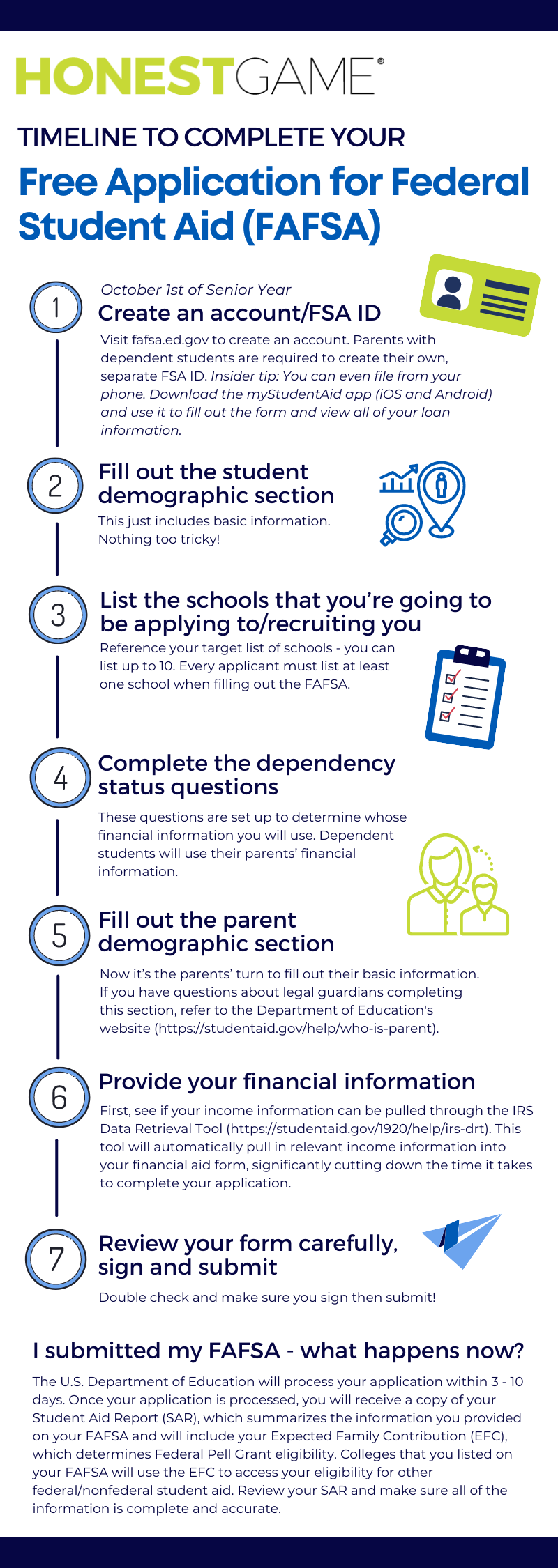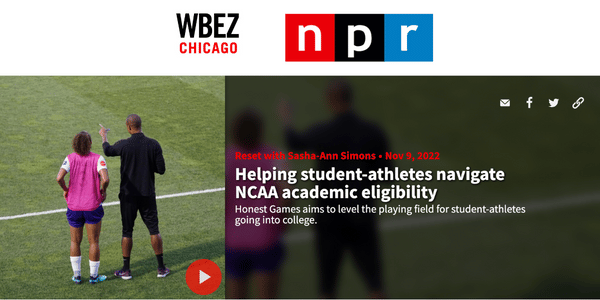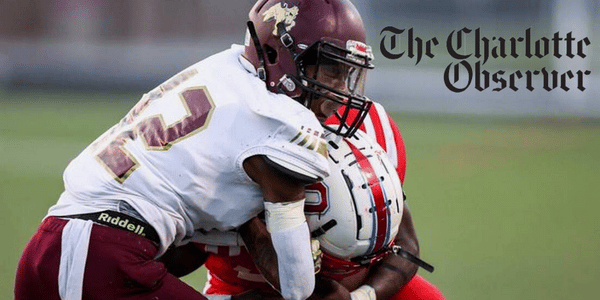FAFSA FAQ: Tips That Can Help Student-Athletes Score More Money for College
Updated on Apr 9, 2025

For student-athletes the dream is always a full-ride scholarship even though NCAA data shows they just aren’t the norm – only about 2% of high school athletes are awarded athletics scholarships to compete in college.
Instead, most recruits might adjust their sights and aim to create a more complete scholarship package by combining athletic scholarship with other opportunities like financial aid. And that all begins with your Free Application for Federal Student Aid (FAFSA).
What is FAFSA?
Free Application for Federal Student Aid (FAFSA) is a financial aid application that determines your eligibility for federal (and state) grants, loans, and work-study funds administered by the U.S. Department of Education. The information from your FAFSA is used to calculate your Expected Family Contribution (EFC) – an index number that colleges use when determining how much financial aid you’d receive if you attend their school.
Why Every Student-Athlete Should Fill Out the FAFSA Application
Even if you don’t think you’ll qualify for federal aid, you should still apply. Most colleges and many private scholarships require students to submit their FAFSA to be considered for financial aid. Some colleges will even evaluate your FAFSA to determine which other kinds of scholarships, like merit-based scholarships, you could qualify for. Plus, a college (and college coach) may take your application more seriously when you’ve submitted a FAFSA.
Some schools also require the CSS Profile in addition to the FAFSA in order to calculate their own financial aid using a different formula. You can find this list here. This form is not free to fill out, as each school requires an additional fee.
You may also find that a few schools require a third form specific to the institution to supplement the information provided on the FAFSA and/or CSS. The school’s financial aid website will usually let you know if this is required.
Do You Have to Fill Out FAFSA to Receive an Athletic Scholarship?
Since athletic scholarships are offered to athletes directly from the school, you don’t necessarily need to fill out a FAFSA to receive one but some schools require students who are receiving a scholarship to fill it out. It’s always best to check with your future coach or the school’s Financial Aid Department to confirm their policy.
Filling out the FAFSA may also work to your advantage since you may qualify for more financial aid than you thought. Even if you have a full athletic scholarship, it only covers the cost of tuition, some fees, room, board, and your books. You’ll still have to pay for your student fees, parking, snacks, and late fees.
Can You Combine Athletic Scholarship And Financial Aid?
You can combine athletic scholarships and financial aid, but it’s important to know how the two items can affect one another and how NCAA regulations can affect this process for both the individual and the program. The specific regulations and policies around athletic scholarship and financial aid combinations can vary based on the division and the school, so it will helpful to speak with the Compliance Office or Director of Financial Aid at the schools you are applying to in order to be aware of how everything works and how it might apply to your situation in recruiting.
How Do College Coaches Use Your FAFSA Application?
Your Expected Family Contribution (EFC) is especially important to college coaches who can offer partial scholarships. Typically, coaches take your EFC into consideration when collaborating with School Admissions to build a competitive scholarship package. For example, if your EFC is low, meaning you won’t be expected to contribute to your college funds, they may work to supplement your package with need-based scholarships. But if they find you have a higher EFC, they may try to mix in merit-based scholarships you won’t be required to pay back.
What Do I Need to Fill Out the FAFSA Application?
To complete the FAFSA application, you will need the following information and if you are a dependent student, then you will also need most of the above information for your parent or guardian:
- Your Social Security Number
- Your Alien Registration Number (if you are not a U.S. citizen)
- Your federal income tax returns, W-2s, and other records of money earned. (Note: You may be able to transfer your federal tax return information into your FAFSA using the IRS Data Retrieval Tool.)
- Bank statements and records of investments (if applicable)
- Records of untaxed income (if applicable)
- An FSA ID to sign electronically.
When Should I fill Out My FAFSA Application?
ASAP! The FAFSA application process opens on December 1st (delayed for 2023) for the following school year. Families are encouraged to complete the FAFSA as soon as possible because aid is awarded on a first-come, first-serve basis. Applications are considered on a rolling basis until June of the following year, but college deadlines are usually earlier (often February or March). So, check the deadlines for schools on your list to ensure you complete your application on time.
No matter where you are in the recruiting process, it’s more important for students and families to have access to information to help make decisions about how to finance their post-secondary journeys.
First Bank Chicago provides support to college-bound students and their families with their financial literacy website to help develop knowledge, skills, and habits that are an important stepping stone on the path to financial well-being as an adult.
Still have questions about affording college? Honest Game has teamed up with First Bank Chicago to provide additional support in real-time with our AI chatbot, “Cleo, the Counselor”. Cleo is here to help students and parents navigate their education pathways successfully. She’s like a counselor on demand who can answer questions about scholarships, paying for college, navigating the recruitment process, and more.
Get started with Cleo by typing #payforcollege.

As a former Senior Associate Athletic Director at the NCAA Division I level and with more than 20 years of experience in collegiate athletics, Courtney has advised thousands of student-athletes through the college recruiting and eligibility process for college sports. Interested in virtual counseling with Courtney? Sign up here.




